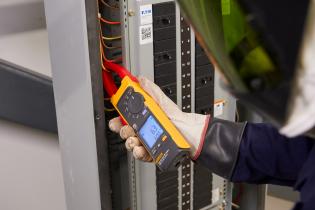All clamps articles
Top 10 solar installation and maintenance tools
Solar power is one of the world’s fastest growing sources of energy. The industry and those who support it through services and related hardware and software are improving and innovating at a rapid pace.
Why use a CAT III rated meter in solar PV installations?
One essential tool for installing, monitoring, and testing photovoltaic systems is the Fluke 393 FC solar clamp meter – rated CAT III 1500 V/CAT IV 600 V for CAT III environments including solar installations.
How to Use Fluke Connect™ software with the Fluke 377 FC and Fluke 378 FC FieldSense™ clamp meters
Fluke Connect software on the 377 FC and 378 FC clamp meters allows you to record, analyze, and share results with others. Trend data for preventive maintenance.
How to Get Faster 3 Phase Power Measurements with Clamp Meters
Get 3 phase power measurements 50% faster with Fieldsense clamp meters. How to measure 3 phase voltage and current simultaneously.
Guide to Using FieldSense in the 377 FC and 378 FC Clamp Meter
Best ways to use the 377 FC and 378 FC clamp meter, how FieldSense technology works and ideal applications for front-line technicians and electricians.
How to use the power quality indicator on the 378 FC clamp meter
Detect basic 3 phase power quality issues with the versatile Fluke 378 FC clamp meter for industrial electricians. Increase productivity and safety without test leads.
Guide to Clamp Meter Symbols: Diagram, Buttons, Dial, Display
Guide to clamp meter symbols, buttons, display and dial functions.
How to measure current with a clamp accessory
How to measure current with a digital multimeter plus clamp accessory.
Why ruggedness matters in a clamp meter
Fluke engineers its clamp meters to withstand a high degree of unconventional use—as a wedge, makeshift pliers, nutcracker, whatever a tech might dream up in a moment of need.
Clamp meter safety tips
Safety is always a priority when working with electricity in industrial sites.
What are Hall Effect (ac, dc) clamp meters?
Hall Effect clamp meters can measure both ac and dc current up to the kilohertz (1000 Hz) range
How to choose the right clamp meter for your job
Fluke’s assortment of clamp meters has been engineered to address a wide variety of needs, from routine tasks to specialty projects.
Inside flexible coil clamp meters
Clamp meters with flexible coil probes can fit into tight spaces
How to measure signals using test probes
Fluke’s assortment of clamp meters has been engineered to address a wide variety of needs, from routine tasks to specialty projects.
How to measure current with a clamp meter
Measuring ac current with a clamp meter’s jaws. Note: Current flowing in opposite directions cancels each other. If current is moving in opposite directions, place just one conductor within the clamp during measurement.
How and why to measure inrush current
Knowing the value of inrush current helps technicians locate startup problems
Why is there an arrow on your current clamp?
Learn why on all current clamps and current clamp accessories, there is an arrow placed close to the beak or inside the beak opening.
How a solar rooftop contractor ensures quality panel installations every time
Using Fluke’s 376 True RMS Clamp Meter, a rooftop solar contractor saves time and ensures quality panel installation by testing throughout the installation process.
Leading facility solutions firm upgrades popular instrument with Fluke Connect model
MacDonald-Miller standardized on the Fluke 902 Clamp Meter when it came out several years ago.
Troubleshooting 4 to 20 mA Process Control Systems without Breaking the Loop
Troubleshooting 4 to 20 mA (milliamp) process control systems without breaking the loop using Fluke 773 Milliamp Process Clamp Meter
Clamp meter readings: problems and solutions
Since a small increase in current flow to a motor produces a proportionately larger amount of heat, motor amperage exceeding nameplate values should be carefully investigated as a possible cause. These overload trips, though often caused by motor loading issues, can also indicate bearing failure, insulation breakdown or voltage unbalance.
Using accessory current clamps with Fluke Digital Multimeters
Accessory current clamps expand a multimeter's flexibility and measurement capabilities by allowing it to measure up to thousands of amps.
Leakage current measurement basics
On circuits protected by GFCIs (Ground Fault Current Interrupters), leakage current can cause unnecessary and intermittent tripping. In extreme cases, it can cause a rise in voltage on accessible conductive parts.
Clamp Meters vs Multimeters
A digital multimeter is essentially a voltage-measuring tool with some current abilities. A clamp meter is basically a current-measuring tool with some voltage abilities. They are distinctly different instruments, each with its own advantages.
Case study: Electric utility plays it safe...
The safety rated Fluke T+Pro gets field-tested by non-electricians. Larger buttons for gloved hands and a battery life indicator helped to make the transition from the old solenoid-based testers to the T+Pro much easier.
Breaking new ground without breaking the loop
Early reports from the field suggest that the new Fluke 772 and 773 Milliamp Process Clamp Meters may be game changers, breaking new ground for technicians in the HVAC controls industry. With the feature sets these meters offer, troubleshooting of the most common problems in modern control systems becomes a snap.
What is a clamp meter?
Clamps measure current. Probes measure voltage. Having a hinged jaw integrated into an electrical meter allows technicians to clamp the jaws around a wire, cable and other conductor at any point in an electrical system, then measure current in that circuit without disconnecting/deenergizing it.
